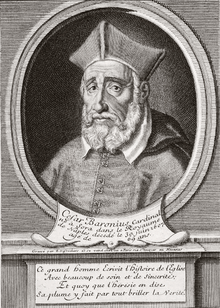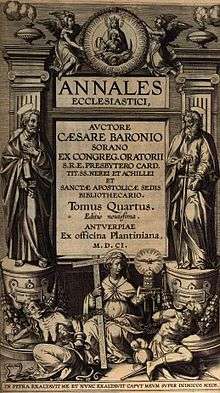Annales Ecclesiastici

Annales Ecclesiastici (full title Annales ecclesiastici a Christo nato ad annum 1198; "Ecclesiastical annals from Christ's nativity to 1198"), consisting of twelve folio volumes, is a history of the first 12 centuries of the Christian Church, written by Caesar Baronius.
Significance
The Annales were first published between 1588 and 1607. This work functioned as an official response to the Lutheran Historia Ecclesiae Christi (History of the Church of Christ). In that work the Magdeburg theologians surveyed the history of the Christian church in order to demonstrate how the Catholic Church represented the Antichrist and had deviated from the beliefs and practices of the early church. In turn, the Annales fully supported the claims of the papacy to lead the unique true church.[1]
Before Baronius was appointed Librarian of the Vatican in 1597, he had access to material and sources in its archives that were previously unpublished or unused. He used these in the development of his work. Accordingly, the documentation in Annales Ecclesiastici is considered by most as extremely useful and complete. Lord Acton called it "the greatest history of the Church ever written."[2]

First edition
The details of the first edition are as follows:[3][4]
| Volume | Published | Dates |
|---|---|---|
| I | 1588 | To 100 AD |
| II | 1590 | 100 to 306 |
| III | 1592 | To 361 |
| IV | 1593 | 361 to 395 |
| V | 1594 | 395 to 440 |
| VI | 1595 | 440 to 518 |
| VII | 1596 | 518 to 590 |
| VIII | 1599 | 590 to 714 |
| IX | 1600 | 714 to 842 |
| X | 1602 | 843 to 1000 |
| XI | 1605 | 1000 to 1099 |
| XII | 1607 | 1100 to 1193 |
The first volume dealt with Gentile prophets, among whom were Hermes Trismegistus, the supposed author of the Corpus Hermeticum, and the Sibylline Oracles of Rome. Some, it was claimed, had foreseen Christ's birth. This was disputed by post-Protestant Reformation scholars, including Isaac Casaubon in his De rebus sacris et ecclesiasticis exercitationes, XVI.[5]
Continuations
Continuators of Baronius of the Early Modern period were Odorico Rainaldi,[6] Giacomo Laderchi,[7] Henri Spondanus,[8] and Abraham Bzovius[9] In the 19th century the Annales were continued by August Theiner.[10]
External links
- Annales Ecclesiastici Vols 1-37 online at Internet Archive
References
- ↑ Robert Benedetto; James O. Duke (13 August 2008). The New Westminster Dictionary of Church History: The early, medieval, and Reformation eras. Westminster John Knox Press. p. 73. ISBN 978-0-664-22416-5. Retrieved 10 September 2012.
- ↑ Lord Acton (1906). Lectures on Modern History, "The Counter-Reformation".
- ↑ treccani.it, Cesare Baronio.
- ↑ Cyriac K. Pullapilly, Caesar Baronius: Counter-Reformation Historian (1975), University of Notre Dame Press, p. 136.
- ↑ Anthony Grafton (15 March 1994). Defenders of the Text: The Traditions of Scholarship in an Age of Science, 1450-1800. Harvard University Press. pp. 145–155. ISBN 978-0-674-19545-5. Retrieved 10 September 2012.
- ↑ Gerald Christianson; Thomas M. Izbicki; Christopher M. Bellitto (2008). The Church, the Councils, and Reform: the legacy of the fifteenth century. CUA Press. p. 54. ISBN 978-0-8132-1527-3. Retrieved 10 September 2012.
- ↑ Euan Cameron (2 September 2005). Interpreting Christian History: The Challenge of the Churches' Past. John Wiley & Sons. p. 264 note 167. ISBN 978-0-631-21523-3. Retrieved 10 September 2012.
- ↑
 Herbermann, Charles, ed. (1913). "Ven. Cesare Baronius". Catholic Encyclopedia. New York: Robert Appleton Company.
Herbermann, Charles, ed. (1913). "Ven. Cesare Baronius". Catholic Encyclopedia. New York: Robert Appleton Company. - ↑ Decima Langworthy Douie (1932). The Nature and the Effect of the Heresy of the Fraticelli. Manchester University Press ND. p. 272. GGKEY:85K67SXS83A. Retrieved 10 September 2012.
- ↑ Joseph-Épiphane Darras; Martin John Spalding (1869). A general history of the Catholic Church: from the commencement of the Christian era until the present time. P. O'Shea. p. 15 note. Retrieved 10 September 2012.